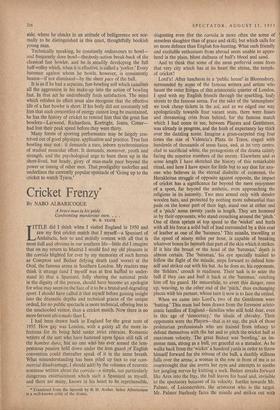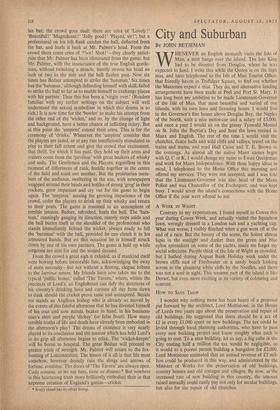Cricket Frenzy
BY NABO ALBARICOQUE
A brave man in his pride Confronting murderous men. . . .
W. B. YEATS ITTLE did I think when I visited England in '1950 and saw my first cricket match' that I myself—a Spaniard of Andalucia, heir to and stolidly content with all that is most dull and obvious in our southern life—little did I imagine that on my return to Madrid I would find my old pleasure in the corrida blighted for ever by my memories of such heroes as Compton and Bedser defying death (and worse) at the Oval, the famous arena in southern London. My readers may think it strange (and I myself was at first baffled to under- stand it) that a Spaniard. fully sharing the national pride in the dignity of the person, should have become an apologist for what may seem on the face of it to be a brutal and degrading sport. I should have called it that myself before gaining insight into the dramatic depths and technical graces of the unique ordeal, for no public spectacle is more technical, offering less to the unschooled visitor, than a cricket match. Now there is no more fervent aficionado than I.
I had been drawn back to England for the great tests of 1955. How gay was London, with a gaiety all the more in- fectious for its being held under strict restraint. Romantic writers of the sort who have battened upon Spain still talk of the hombre duro; but no one who has ever sensed the tem- pestuous passion held down under the iron guard of English convention could thereafter speak of it in the same breath. What misunderstanding has been piled up (not to our com- mercial disadvantage, I should add) by the volumes of neurotic nonsense written about the corrida—a simple, not particularly dangerous entertainment which such a Spaniard as myself, and there are many, knows in his heart to be reprehensible,
• Translated from the Spanish by B. H. Archer. Senor Albaricoque is a well-known critic of the drama.
disgusting even (for the corrida is more often the scene of senseless slaughter than of grace and skill), but which calls for no more defence than English fox-hunting. What such friendly and excitable enthusiasts from abroad seem unable to appre- hend is the plain, blunt dullness of bull's blood and sand.
And to think that some of the most perfervid come from that very city which has at its heart the shrine, the temple. of cricket !
Lord's! After luncheon in a 'public house' in Bloomsbury, surrounded by some of the famous writers and artists who haunt the outer fxinges of this aristocratic quarter of London, I sped with my English friends through the sparkling, leafy streets to the famous arena. For the sake of the 'atmosphere' we took cheap tickets in the sol, and as we edged our way apologetically towards four vacant seats, there were hisses and threatening cries from behind, for the famous match which I had come to see, between Players and Gentlemen, was already in progress, and the hush of expectancy lay thick over the dazzling scene. Imagine a grass-carpeted ring four times the size of Valencia's Plaza de Toros, ringed with hundreds of thousands of tense faces, and, at its very centre, clad in sacrificial white, the protagonists of the drama calmly facing the superior numbers of the enemy. Elsewhere and at some length I have sketched the history of this remarkable ritual, and here I have space for little but to say that for any- one who believes in the eternal dialectic of existence, the Herakleitan struggle of opposite against opposite, the impact of cricket has a significance far beyond the mere enjoyment of a sport, far beyond the esthetic, even approaching the religious in its intensity. Two men armed only with slender wooden bats, and protected by nothing more substantial than pads on the lower part of their legs, stand one at either end of a 'pitch' some twenty yards in length. They are hemmed in by their opponents, who stand crouching around the 'pitch.' One of them sprints at top speed to the 'wicket' and hurls with all his force a solid ball of lead surrounded by a thin coat of leather at one of the 'batsmen.' This missile, travelling at the speed of ninety miles per hour, is capable of breaking whatever bones lie beneath that part of the skin which it strikes. If it hits the breast or the head of the 'batsman,' death is almost certain. The 'batsman,' his eye specially trained to follow the flight of the missile, steps forward to defend him- self and strikes out with his bat. As he does so, his opponents, the 'fielders,' crouch in readiness. Their task is to seize the ball if they can and hurl it back at the 'batsman,' catching him off his guard. He meanwhile, to avert this danger, runs up, weaving, to the other end of the `pitch,' thus exchanging places with his partner, whose turn, it now is to face the ordeal.
When we came into Lord's, two of the Gentlemen were `batting.' This team had been drawn from the foremost aristo- cratic families of England—families who still hold dear, even in this age of 'democracy,' the ideals of chivalry. Their oppo'nents were the Players—that is to say, the pick of those proletarian professionals who are trained from infancy to defend themselves with the bat and to pitch the cricket ball at maximum velocity. The great Bedser was 'bowling,' an im- mense man, strong as a bull, yet graceful as a matador. As he walks back from the 'wicket' a hundred yards in order to throw himself forward for the release of the ball, a deathly stillness falls over the arena; a woman in the row in front of me is so overwrought that she averts her eyes and attempts to soothe her jangling nerves by knitting a sock. Bedser streaks forward like Ares into the fray, the ball leaves his hand and, invisible to the spectators because of its velocity, hurtles towards Mr. Palmer, of Leicestershire, the aristocrat who is the target. Mr. Palmer fearlessly faces the missile and strikes out with his bat; the crowd goes mad; there are cries of 'Lovely 1' `Beautiful!"Magnificent !"Jolly good !"Played, sir!'; but a professional on his left flank catches the ball, deflected from the bat, and hurls it back at Mr. Palmer's head. From the crowd there, come cries of `shot! Shot!'—they clearly antici- pate that Mr. Palmer has been eliminated from the game; but Mr. Palmer, with the insouciance of the true English gentle- man, without twitching a muscle, merely moves his head an inch or two to the side and the ball flashes past. Now six times has Bedser attempted to strike the 'batsman.' Six times has the 'batsman,' although defending himself with skill, failed to strike the ball so far as to enable himself to exchange places with his partner. Thus this has been a 'virgin over.' (Readers familiar with my earlier writings on the subject will well understand the sexual symbolism in which this drama is so rich.) It is now time for the 'bowler' to make his attempt from the other end of the `wicket,' and so, by the change of light and background, have a better chance of inflicting injury. But at this point the 'umpires' extend their arms. This is for the ceremony of 'drinks.' Whenever ,the 'umpires' consider that the players are jaded, or at any rate insufficiently stimulated to play to their full extent and give the crowd that excitement, that thrill, for which it has paid, they hold up their arms and waiters come from the 'pavilion' with great beakers of whisky and soda. The Gentlemen and the Players, regardless in this moment of differences of rank, huddle together in the centre of the field and toast one another. But the proletarian mem- bers of the audience,. sweltering in the sun, with newspapers wrapped around their heads and bottles of strong 'grog' in their pockets, grow impatient and cry out for the game to begin again. The 'umpires,' sensing the growing impatience of the crowd, order the players to drink up their whisky and return to their posts. The game is resumed in an atmosphere of terrible tension. Bedser, refreshed, hurls the ball. The 'bats- man,' cunningly gauging its direction, merely steps aside and the ball buries itself in the shoulder of the professional who stands immediately behind the wicket, always ready to fell the 'batsman' with the ball, provided he can clutch it in his armoured hands. But on this occasion he is himself struck down by one of his own partners. The game is held up while surgeons are sent for and the wound dressed.
From the crowd a great sigh is exhaled, as if mankind itself were bowing before inexorable fate, acknowledging the sway of stern necessity—but not 'without a fleeting, elegiac tribute to the lacrinue rerutn. My friends have now taken me to the typical 'public house,' called 'The Tavern,' where, within the precincts of Lord's. an Englishman can defy the strictness of his country's drinking laws and carouse all day from dawn to dusk should the cricket prove tame and uninspired. Beside me stands an Anglican bishop who is already so moved by the events of this fateful afternoon that he has divested himself of his coat and now stands, beaker in hand, in his business- man's shirt and purple 'dickey' (or false front). How many terrible truths of life and death have alreadybeen embodied in the afternoon's play! The drama of existence is very nearly played to its conclusion and the tension which has held Lord's in its grip all afternoon begins to relax. The `wicicet-keeper' will be borne to hospital. The great Bedser will proceed to greater trials of strength. Mr. Palmer will return to the fox- hunting of Leicestershire. The lesson of it all is that life must somehow, however densely rain the slings and arrows of fortime, continue. The doors of 'The Tavern' are always open. Cada senuma, as we say here, tiene su disanto.* But nowhere is this heartening truth more brilliantly, embodied than in that supreme creation of England's genius—cricket.
• Every cloud has its silver lining.



































 Previous page
Previous page